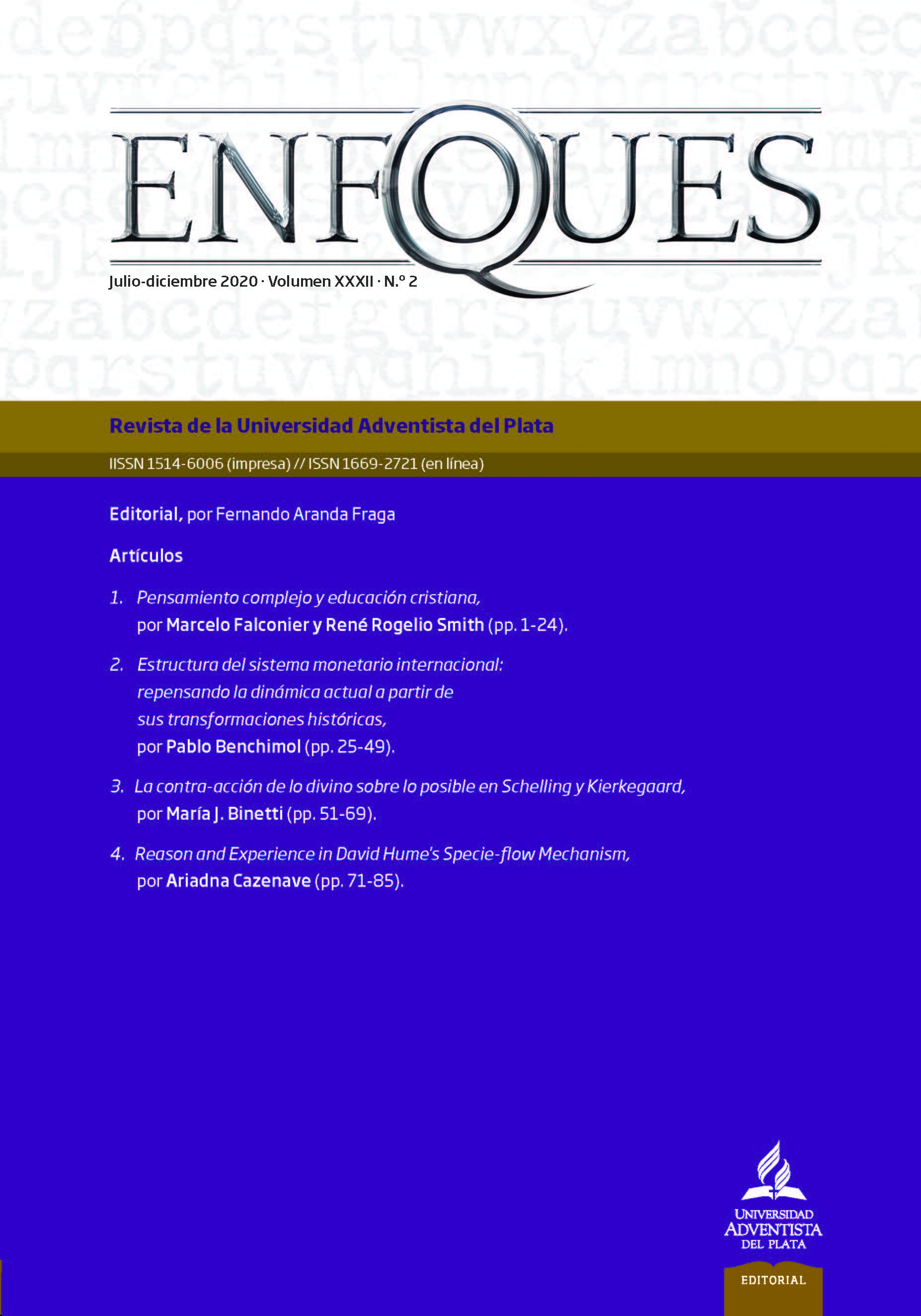The Counter-Action of the Divine or on the Possible in Schelling and Kierkegaard
Keywords:
Reflection, Negativity, Potency, Birth, Existence, FreedomAbstract
The current article aims at showing the terms in which the concept of possibility elaborated by Friedrich W. J. Schelling breaks with the metaphysical dualism between the immutable Act and pure potency by introducing into the absolute certain reflection, counter-action or subtraction from which emerges the infinite possibility of divine birth. Kierkegaard, on his part, will find in such possibility the origin of the singular existence and engine of her inexhaustible and contradictory becoming. Reflection, negativity, possibility and freedom are then the three main categories of a new concept of existence, which disrupts classical dualism to give birth to the divine.Downloads
References
Jacob Böhme, Aurora (Frankfurt am Main und Leipzig: Gerhard Wehr. Insel., 1992), 464.
Cf. Friedrich W. J. Schelling, Filosofía de la Revelación, Cuadernos de anuario filosófico, Serie Universitaria 51 (1998), 138.
Friedrich W. J. Schelling, Investigaciones filosóficas sobre la esencia de la libertad humana y los objetos con ella relacionados (Barcelona: Anthropos, 1989), 167, 253.
Cf. Friedrich W. J. Schelling, The Grounding of Positive Philosophy. The Berlin Lectures (New York: State University of New York), 175-77.
Schelling, Investigaciones filosóficas, 169.
Friedrich W. J. Schelling, Clara. Un diálogo sobre la muerte (Santiago de Chile: Editorial Universitaria, 2015), 97.
Ibíd., 89.
Schelling, Investigaciones filosóficas.
Friedrich W. J. Schelling, Las edades del mundo (Madrid: Akal, 2002), 247.
Schelling, Investigaciones filosóficas, 165.
Ibíd., 165-7.
Ibíd., 139.
Schelling, The Grounding of Positive Philosophy, 209.
Schelling, Investigaciones filosóficas, 169.
Ibíd., 281.
Ibíd., 169.
Cf. Ana Carrasco-Conde, “Fundamental Perspectives: Simulacra, History and the Influence of Schelling in contemporary Thought”, International Journal of Zizek Studies 10, n.o 3 (2019): 1-20; Markus Gabriel, “Aarhus Lectures. Schelling and Contemporary Philosophy. Second Lecture: Schelling’s Ontology in the Freedom Essay”, SATS-Northern European Journal of Philosophy 15, n.o (2014): 75-98; Markus Gabriel, Transcendental Ontology: Essays on German Idealism (New York: Continuum, 2011).
Schelling, Investigaciones filosóficas, 163.
Schelling, Las edades del mundo, 183.
Ibíd.
Schelling, Investigaciones filosóficas, 110.
Schelling, Las edades del mundo, 187.
Ibíd., 185.
Slavoj Žižek, Absolute Recoil. Towards a New Foundation of Dialectical Materialism (London & New York: Verso, 2014), 342.
Schelling, Las edades del mundo, 212.
Ibíd., 244.
Ibíd., 208.
Schelling, Investigaciones filosóficas, 147; también, Schelling, Escritos sobre filosofía de la naturaleza (Buenos Aires: Alianza, 1996), 247-48.
Søren Kierkegaard, Søren Kierkegaards Samlede Værker (Copenhagen: Gyldendal, 1920-1936), VII 321; Kierkegaard, Søren Kierkegaard Skrifter (Copenhagen: Gads Forlag, 1997-2013), 7, 304.
Søren Kierkegaard, Søren Kierkegaards Papirer (Copenhagen: Gyldendal, 1909-1948), I A 29-30; IV A 102; IV A 157; Kierkegaard, Skrifter, JJ:374.d; JJ:160.
Kierkegaard, Samlede Værker, XIV 287-306.
Kierkegaard, Papirer, XI2 A 97 / Kierkegaard, Skrifter, NB33:19.
Cf. ibíd., X4 A 212 / NB23:205.
Ibíd., VII1 A 181 / NB:69.
Kierkegaard, Samlede Værker, IV 267 / Skrifter, 4, 275.
Cf. Kierkegaard, Notes of Schelling’s Berlin Lectures (Princeton: Princeton University Press, 1989), 338-339.
Kierkegaard, Samlede Værker, IV 349 / Skrifter, 4, 351.
Kierkegaard, Papirer, IV 347 / Skrifter, 4, 349.
Ibíd., V A 16 / JJ:209.
Kierkegaard, Samlede Værker, IV 466 / Skrifter, 4, 438.
Ibíd.
Kierkegaard, Papirer, X1 A 328 / Skrifter, NB11:33.
Cf. Ibíd., XI1 A 400 / NB31:68.
Kierkegaard, Samlede Værker, IV 398 / Skrifter, 4, 394.
Cf. Ibíd., I 319 / 2, 295.
Ibíd., XIV 384 ss.; Papirer, VIII2 B 83 ss.
Ibíd., III 243 / Skrifter, 4, 53.
Published
Issue
Section
License
Copyright (c) 2020 María José Binetti

This work is licensed under a Creative Commons Attribution-NonCommercial-ShareAlike 4.0 International License.




